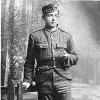Angus VC, William (1888 - 1959)

Corporal, 8th Bn. Highland Light Infantry
Corporal William Angus, VC, of the 8th Highland Light Infantry, was the first Scottish Territorial soldier to be awarded the coveted Victoria Cross during the First World War.
Buried at Wilton Cemetery
Commemorated at
Angus was the son of a Carluke coal miner and had eight siblings. Before the war he had followed his father down the mines, and had begun his semi-professional footballing career, signing for Celtic in 1912. After the war he had a business as a goods carrier, married and had five children. He died in 1959, aged 71, and he and his wife Mary are buried in Wilton Cemetery, Carluke.
Staggering back to their trench as bombs fell, two men emerged through the smoke from a rescue mission that stunned their fellow soldiers. William Angus had crept over the parapet and crawled across no man's land to reach his wounded comrade. It was an action that gained him the Victoria Cross, the first awarded to a Scots territorial soldier during the war.
Lance Corporal Angus, a former Celtic player, was with The Highland Light Infantry, 70 yards from the German front line. On 12 June, 1915, the men were ordered to attack. Led by Lieutenant James Martin, they captured the trench, but found it full of mines, and were ordered back. An explosion quickly followed and Martin was missing. As the smoke cleared, he was seen lying 15 yards from the German trenches.
Between safety and danger:
An eyewitness described the Germans' periscope reaching up eerily and being trained, first on Martin, then on the British line then, slowly, turning back on the injured soldier. For the next hour, the two sides watched each other. Suddenly, Martin made a move for his trench, but the Germans opened fire. They dashed for Martin but British fire pushed them back. Angus volunteered to go out and bring Martin back, a request his commanding officer at first refused, as Martin lay just a few feet from the German parapet.
Rescue by stealth:
The British turned their fire on the German line and, while the attack took place, Angus slipped over the parapet and crawled towards Martin. The Royal Scots' commanding officer wrote to the soldier's father: "It seemed so hopeless. With a rope 50 yards long, your son crept out. Owing to the clever way he crept, he got to Martin without being seen. Martin staggered to his feet and, directed by Angus, made a dash for our line."
Angus had at least a dozen bombs thrown at him as he guided Martin back, but the two men stumbled to safety through the smoke. Angus lost sight in one eye and had injuries to his legs, arms, head and shoulders. When Martin visited him in hospital, both men were overcome and neither could speak.
A hero comes home:
Three months later, Carluke's streets were packed at Angus's homecoming ceremony. Flanked by Martin and the Lord Newlands, the chairman of the Lanarkshire territorial force, Angus received a hero's welcome. Martin thanked his rescuer: "It was an act of bravery second to none in the annals of the British Army." Praise for his actions came from many others, including William Maley, the secretary of Celtic, who remarked: "No club ever had a more willing or conscientious player, and one who always showed that fine spirit."




